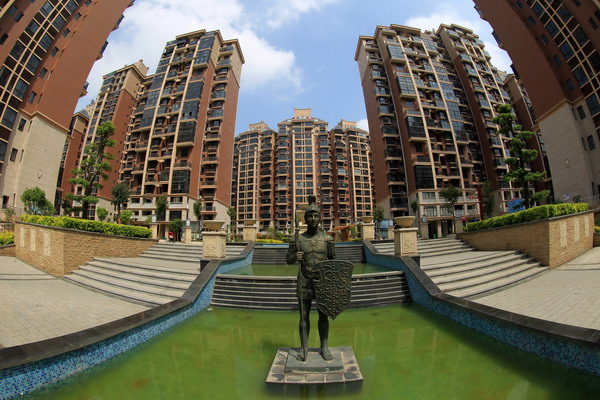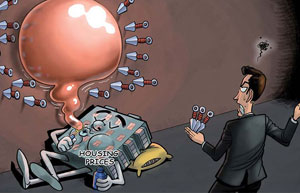|
 Newly built houses are seen in Xuchang city, Henan province, April 14, 2014. The surge in urban housing prices may end soon, as the latest industry data show weaker sales and price rises, according to specialists.??[Photo by Niu Yuan / Asianewsphoto] |
The surge in urban housing prices may end soon, as the latest industry data show weaker sales and price rises, according to specialists.
In March, of the 70 largest mainland cities, 10 reported that prices were flat month-on-month in the new-home market, four saw prices drop, while 56 saw prices continue to gain, compared with 57 in February, the National Bureau of Statistics reported on Friday.
In the pre-owned market, the number of cities where home prices dropped or remained unchanged month-on-month rose to 28 in March, up from 24 in February.
The housing market was at its least robust last month since the start of 2013, some analysts said.
The statistics bureau said on Wednesday that in the first quarter, floor space in newly started housing projects fell by 27 percent year-on-year.
A Beijing News commentary said a major turning point in the housing market could be inevitable.
A spokeswoman for the Beijing statistics bureau said on Friday that sales of commercial residential housing units in the capital fell by as much as 43.2 percent year-on-year in the first quarter to 1.7 million square meters in floor space, although the city's general housing prices were still rising.
Zhang Dawei, chief analyst at property agent Centaline Group's Beijing branch, said: "The property market probably peaked in the last quarter of 2013. Sales and prices will continue to decline in the coming months if mortgage policies remain so tight."
Currently, second-home buyers need to make a 70 percent down payment.
Zhang said there could still be a time lag between the latest statistics and market realities.
Data from Centaline show that only 8,943 pre-owned homes were sold in Beijing in March, the lowest for monthly sales since 2009.
"The tightening of credit lines and an increase in government subsidized housing projects have both contributed to a wait-and-see attitude in the market," Zhang said.
Mao Daqing, executive vice-president of Vanke, one of the country's largest property developers, said: "Extremely high land costs have driven housing prices beyond society's affordability. Vanke will try to increase sales by keeping prices flat while remaining conservative about land purchases."
The housing market is worse in smaller cities, where stock has exceeded demand.
Zhang Zhiwei, an economist at Nomura Securities in Hong Kong, said the property markets in the country's third- and fourth-tier cities face severe risks, which will pose the biggest challenge to the Chinese economy in the next two to three years.
Zhu Haibin, chief economist in China at JPMorgan, said there may be some degree of selective easing in property market policies, such as purchasing restrictions and mortgage terms in some cities where the housing market is nearing a slump.
"But we don't expect a major shift in the national property policy in the near term," he said.
 |
 |
| Home price growth slows, further moderation eyed |
|
